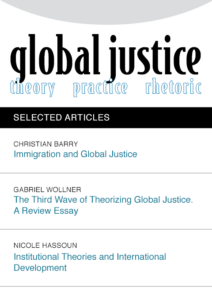By Julian Culp

This special issue aims at clarifying the normative import of considerations of global justice for the theory and practice of development or, more precisely, of social development. For some, this topic may seem outdated. After all, prominent theorists of global justice, such as Charles Beitz, emphasized long ago that one central implication of accepting duties of global distributive justice is to stop viewing development assistance as a practice of international charity. Thus one could think that the relation between theories of global justice and the theory and practice of development would have been treated carefully ever since. However, there seems to remain up to now a curious neglect of this relation. Consider, for instance, the recent and continuing transnational political deliberations about how to assess development, such as those of the ‘Sarkozy’ Commission on the Measurement of Economic Performance and Social Progress. These deliberations take little note, if any, of contemporary theories of (global) justice. This is remarkable given that many of these theories not only represent a kind of public philosophy that is meant to be practically action-guiding, but also have as their subject matter the reasonable evaluation of our social and political orders. Thereby these deliberations overlook one central philosophical insight of recent theorizing about justice, namely, that the fundamental guiding principles of our social and political orders should not express one particular conception of the good life.
Published:
2014
DOI:
doi.org/10.21248/gjn.7.0.42
Online available:
www.theglobaljusticenetwork.org